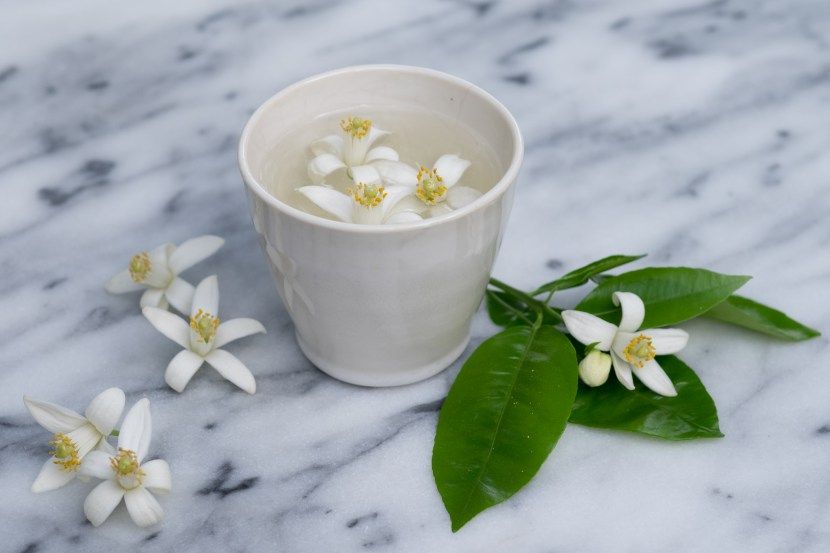
Have you ever stood beneath an orange tree in full bloom?
The first thing you notice is the scent, at once delicate and overpowering. As you breathe in the warm, sweet fragrance, your ears tune into the music overhead. You look up and see bees buzzing from each waxy white flower to the next. And then you feel it – that sense of joyful calm and relaxation.
Ahhhh.
The flowers of sweet orange (Citrus x sinensis) and bitter orange (Citrus x aurantium) have been used for centuries in food, drink, medicine, perfume, and ceremony.
Queen Victoria famously wore a wreath of orange blossoms on her wedding day, echoing a tradition that stretched back to ancient China and Syria. It was in the Middle East that the practice arose of distilling bitter orange flowers into essential oil and using the byproduct, orange flower water, to flavor foods like baklava. In 1888, New Orleans bartender Henry C. Ramos added orange flower water to the cocktail that is now known as a Ramos Gin Fizz.
As an herbal remedy, orange blossoms and orange flower water have been employed as a nervine and sedative to treat anxiety, depression, and insomnia. People have also used the mildly bitter flowers to treat stomach upset and promote digestion. (To learn more about orange and orange blossom as medicine, see this excellent article from Kings Road Apothecary.) I’ve also found grapefruit blossoms to work in much the same way.
Here in Los Angeles, our orange and grapefruit trees burst into bloom this week, and I’m spending as much time as possible outdoors to revel in this ethereal moment. Like the bees, I am busy, turning small handfuls of the flowers into bitters and elixirs to enjoy in the weeks or months to come. My favorite concoction, though, is the simplest and most fleeting: fresh citrus blossom tea.
I first encountered orange blossom tea at a small Lebanese restaurant in Paris. I was seventeen and traveling with my grandparents, who ordered coffee after supper. In lieu of caffeine, the waiter brought me a cup of ahwah baida, also known as café blanc or white coffee. This simple mixture of hot water + orange flower water tasted clean and soothing, a perfect digestif after a big meal. Put me in front of Lebanese food, and I will eat enough for 10 people — that waiter probably saved me from a night of indigestion!
I’ve been making white coffee ever since and, like most folks, typically use bottled orange blossom water. (Note: you can make your own orange flower water using the Rose Water recipe in Wild Drinks & Cocktails, page 46.) However, during those brief moments when one has access to fresh citrus flowers, I implore you to slow down, steep a few blossoms in hot water, and sit down to sip.
You might drink this tea in the middle of the day to calm your nerves, after dinner as a digestive aid, before bed to help you relax … or simply to appreciate the beauty that this world has to offer.
Orange Blossom Tea
Makes 1 serving
6 fresh orange blossoms
1 cup boiling water
Honey or sugar (optional)
Shake the orange blossoms to remove any insects. Place the blossoms in a tea cup, pour boiling water over, and cover. Let steep for 5 minutes.
Lift the orange blossoms out with a fork. The blossoms are so pretty that you may be tempted to leave them in! However, the tea will become increasingly bitter as the flowers steep. You may want to leave just one or two flowers in the cup as garnish, and then remove them if the tea starts to taste too bitter.
Sweeten the tea with honey or sugar, if desired.
Notes
• If you don’t have fresh orange blossoms, you can substitute other citrus flowers, 3 dried orange flowers, or a teaspoon of orange blossom water.
• On a hot day, this tea is lovely over ice, with a sprig of mint.
